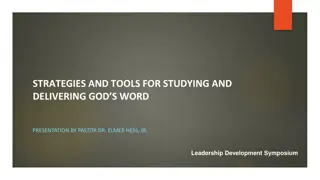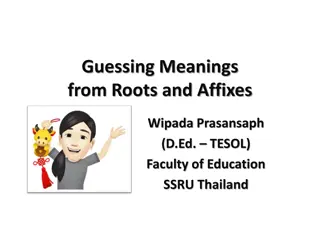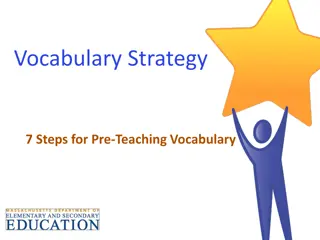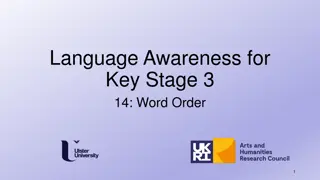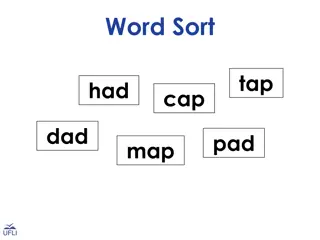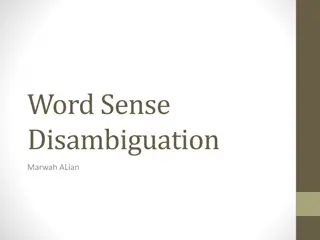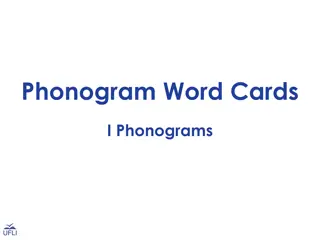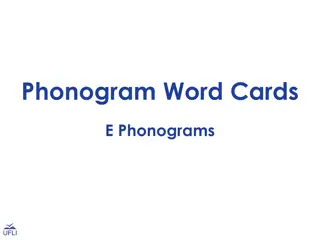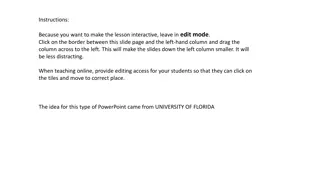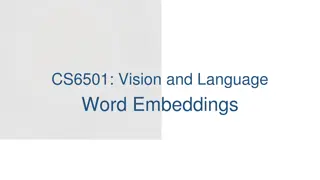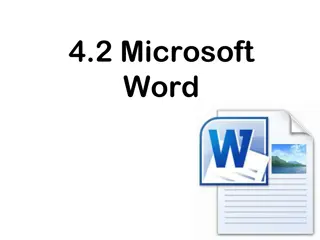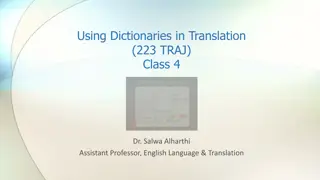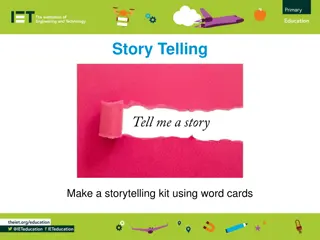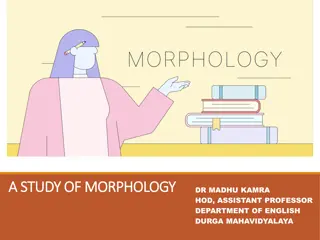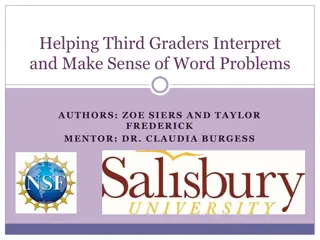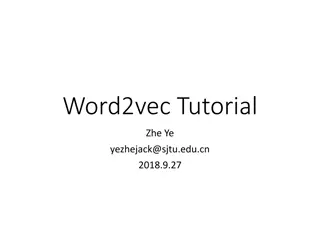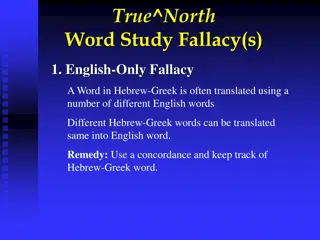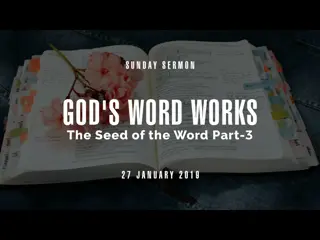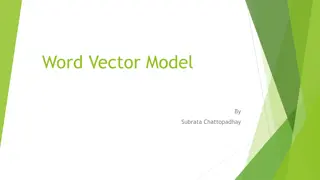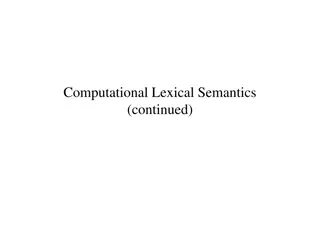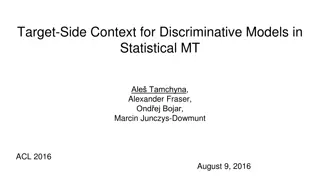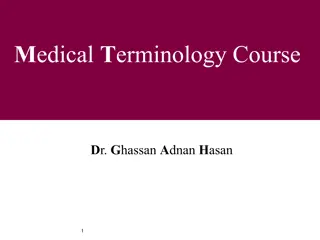Deepening Faith Through Christian Meditation at Reid Temple AME Church
Christian meditation at Reid Temple AME Church focuses on going higher in faith through deep contemplation of God's Word. The church's core values include faith in God, integrity, empowerment, excellence, and Christ-centered leadership. With strategic goals such as membership growth and community co
0 views • 16 slides
Ways of Enlarging the Vocabulary of a Language Word-Formation and Borrowing in Modern English.
Explore various types of word-building processes in Modern English, including morphological, syntactic, and mixed methods like affixation, composition, conversion, and borrowing. Understand the classifications of affixes, techniques in morphological word-building, and the diversity of the English vo
2 views • 31 slides
Understanding Minor Morphological Processes in English Language
Explore minor morphological processes in the English language, including word-building processes like conversion and clipping. Conversion involves changing a word's part of speech without affixes, while clipping shortens words without altering meaning. Acronyms and abbreviations are also discussed i
10 views • 12 slides
Understanding Semasiology: The Study of Word Meaning
Semasiology is a branch of linguistics focused on the meaning of words. It delves into various aspects of lexical meaning, semantic development, polysemy, and semantic structure. Through exploring types of word meanings and semantic changes, semasiology helps us comprehend the intricate nuances of l
4 views • 19 slides
Strategies and Tools for Studying and Delivering God's Word Presentation
Explore the leadership development symposium led by Pastor Dr. Elmer Hess Jr., focusing on strategies and tools for studying and delivering God's Word. Participants aim to grow in their desire to know, live, and share the Word of God, emphasizing spiritual knowledge, growth, and influencing others.
3 views • 80 slides
Methods of Investigating Foreign and Native Languages
The lecture discusses methods and ways of investigating foreign and native languages, highlighting the importance of understanding language as a system of signs. It delves into various linguistic structures and theories, including Phortunatov's theory of word form and N. Peterson's approach to defin
11 views • 25 slides
Understanding Medical Word Elements: Roots, Combining Forms, Suffixes, and Prefixes
Medical terminology uses word elements like roots, combining forms, suffixes, and prefixes. Word roots provide the main meaning, combining forms connect elements, suffixes modify word meaning, and prefixes are placed at the beginning of words. Examples illustrate how these elements are used in medic
6 views • 13 slides
Understanding Word Meanings Through Roots and Affixes in Education
Exploring how to decipher unfamiliar words by analyzing their roots, prefixes, and suffixes from a linguistic perspective. Latin roots and examples are provided to demonstrate how word parts contribute to the overall meaning of a word.
1 views • 69 slides
Effective Pre-Teaching Vocabulary Strategies for ELs
ELs benefit from specific pre-teaching vocabulary strategies such as selecting important words, providing contextual understanding, offering student-friendly definitions, and engaging in oral interactions. Massachusetts Department of Elementary and Secondary Education emphasizes the importance of ch
2 views • 7 slides
Stages of First Language Acquisition in Children
First language acquisition in children progresses through distinct stages including cooing and babbling, the one-word stage, the two-word stage, and telegraphic speech. These stages mark the development of speech sounds, single-word utterances, two-word combinations, and more complex speech structur
2 views • 16 slides
Understanding Word Order in Different Languages
Explore the fascinating world of word order in languages. Discover how different languages arrange words in various ways, such as Subject-Verb-Object (SVO), Subject-Object-Verb (SOV), and more. Delve into the diversity of word orders for subjects, objects, and verbs, and uncover how language structu
2 views • 31 slides
Faithful Living and Preaching God's Word in 2 Timothy
In 2 Timothy, the call to preach the Word faithfully is emphasized, highlighting the importance of living with courage and commitment in spreading God's message. The text underscores the need to remain steadfast in the face of challenges and to uphold the truth of God's Word amidst changing times. T
0 views • 12 slides
Engaging Word Sorting Activity for Students
Encourage student engagement with a hands-on word sorting activity involving phonograms. Students copy word cards into categories, read each word, and determine its appropriate category in a fun and interactive manner using a sorting chart.
2 views • 5 slides
Understanding Medical Terminology: Word Elements and Common Suffixes
Medical terminology combines word roots, suffixes, prefixes, and combining forms to create meaningful terms. Learn how these elements come together in medical language, with examples such as mastectomy, psychology, and dermatology. Explore the study of various body parts and conditions through the l
6 views • 5 slides
Understanding Word Sense Disambiguation: Challenges and Approaches
Word Sense Disambiguation (WSD) is a complex task in artificial intelligence that aims to determine the correct sense of a word in context. It involves classifying a word into predefined classes based on its meaning in a specific context. WSD requires not only linguistic knowledge but also knowledge
2 views • 12 slides
Phonogram Word Cards for Phoneme-Grapheme Correspondences
Explore lists of words with the same phonograms to teach new phoneme-grapheme correspondences, ideal for review games like Word Sorts and other activities requiring phonogram-based word lists. Enhance reading and spelling skills through engaging practices with word groups like nice, price, rice, sli
0 views • 26 slides
Understanding Word Formation: Processes, Neologisms, and Borrowing
Delve into the fascinating world of word formation processes, from coinage and eponyms to borrowing and compounding. Explore how new words enter languages, the study of word origins (etymology), and the dynamics of creating and adopting new linguistic terms.
0 views • 16 slides
Phonogram Word Cards for Teaching Phoneme-Grapheme Correspondences
Explore a collection of phonogram word cards featuring various phoneme-grapheme correspondences for educational activities like word sorts and review games. Enhance phonics skills with word lists containing words sharing the same phonogram, covering a wide range of graphemes and phonemes. Utilize th
0 views • 32 slides
Understanding Word Meaning in Lexical Semantics
Introduction to Chapter 5 Lecture 4.1 discusses the nature of word meaning, major problems of lexical semantics, and different approaches. It explains the concept of a word, prototypical words, lexical roots, lexemes, and word forms, highlighting the importance of the word as a lexeme in lexical sem
1 views • 20 slides
Enhancing Study Skills for Level 3 Vocational Qualifications
Developing study skills is crucial for success at East Surrey College. This project focuses on preparing students for Level 3 study programs by promoting independence, organization, self-motivation, and curiosity for learning. Through tasks like Microsoft PowerPoint and Word assignments, students wi
0 views • 17 slides
Interactive Word Study Lesson on Ants and the Animal Kingdom
Explore the fascinating world of ants and the animal kingdom through an interactive word study lesson. Discover focus words, suffix identification, compound words, and creating new words with prefixes. Engage students in hands-on activities to enhance language skills and understanding of word format
0 views • 7 slides
Exploring Word Embeddings in Vision and Language: A Comprehensive Overview
Word embeddings play a crucial role in representing words as compact vectors. This comprehensive overview delves into the concept of word embeddings, discussing approaches like one-hot encoding, histograms of co-occurring words, and more advanced techniques like word2vec. The exploration covers topi
1 views • 20 slides
Understanding Microsoft Word: Features and Functions
Explore the key components and objectives of Microsoft Word, a versatile word processing tool in the Microsoft Office Suite. Learn about the user interface, commands, text manipulation, keyboard shortcuts, working with pictures and language tools, and the benefits of using word processing software.
0 views • 29 slides
Understanding Word Formation and Coinage in English
Word formation in English involves different processes such as compounding, conversion, and derivational affixation. Compounding combines two or more words to create a new word, while conversion changes the word class without affixes. Word coinage includes compounds, acronyms, back-formations, abbre
0 views • 10 slides
Understanding the Role of Dictionaries in Translation
Dictionaries play a crucial role in translation by helping users find information about linguistic signs, word division, spelling, and word formation. The lemma serves as a representative of a lexical item in a dictionary, aiding users in locating specific entries. Word division information can assi
0 views • 12 slides
Creative Word Play Storytelling Kit
Unleash your creativity with the Creative Word Play Storytelling Kit using word cards. Safely cut out and sort the word cards into piles representing different parts of speech. Create unique sentences by combining cards from each pile and let your imagination run wild as you build stories. Expand th
0 views • 6 slides
A Study of Morphology: Insights into Word Formation and Structure
Morphology, a field of linguistics originating from Greek words, delves into the study of word structure. It explores types of morphemes, branches of morphology, and processes like affixation and vowel change. The creation of new words and changes in existing ones through grammatical functions are a
0 views • 9 slides
Helping Third Graders Make Sense of Word Problems: A Research Study
Research explores challenges students face in engaging with word problems, highlighting the need to enhance problem-solving strategies. The study investigates students' problem-solving approaches before, during, and after instruction to determine changes in strategies over time. Using a literature-b
0 views • 23 slides
Understanding Word Vectors and Training with Gensim
Explore the differences between one-hot representation and word vectors, learn about virtual environments in Python for training word vectors, and dive into the process of evaluation, analogy, and word clustering. Discover tools like Anaconda and Virtualenv, popular libraries like Gensim, and the si
0 views • 16 slides
Understanding Text Similarity Techniques in NLP
Explore various text similarity techniques in Natural Language Processing (NLP), including word order, length, synonym, spelling, word importance, and word frequency considerations. Topics covered include bag-of-words representation, vector-based word similarities, TF-IDF weighting scheme, normalize
2 views • 62 slides
Effective Strategies for Word Study in Text Analysis
Explore common fallacies in word study such as the English-Only Fallacy, Root Fallacy, Time-Frame Fallacy, and Over-load Fallacy. Learn how to overcome these fallacies by giving context priority and using concordances. Discover practical steps to choose words for study, including looking for critica
0 views • 7 slides
Understanding the Parable of the Sower and Receiving God's Word
The Parable of the Sower teaches us how to receive and nurture God's Word in our hearts to produce fruit in our lives. Through the seed of God's Word, we learn the importance of protecting, understanding, and guarding our hearts from distractions and challenges that may hinder its growth and impact.
0 views • 24 slides
The Power of the Word: Lessons on Faith Chapter 17
Discover the profound impact of the Word of God on our lives as portrayed in Lessons on Faith Chapter 17. Just as the earth thrives with rain and snow, our lives flourish with the Word. Embrace the transformative power of God's Word and let it work within you to bring forth righteousness and peace.
0 views • 13 slides
The Sunday of the Word of God Celebration - 24th January 2021
The Sunday of the Word of God, observed on the 24th of January 2021, is dedicated to the celebration, study, and dissemination of the Word of God. Pope Francis encourages Catholics worldwide to deepen their relationship with God through His Word. The event highlights the importance of valuing both t
0 views • 27 slides
Understanding Word Vector Models for Natural Language Processing
Word vector models play a crucial role in representing words as vectors in NLP tasks. Subrata Chattopadhyay's Word Vector Model introduces concepts like word representation, one-hot encoding, limitations, and Word2Vec models. It explains the shift from one-hot encoding to distributed representations
0 views • 25 slides
Understanding Word Sense Disambiguation in Computational Lexical Semantics
Word Sense Disambiguation (WSD) is a crucial task in Computational Lexical Semantics, aiming to determine the correct sense of a word in context from a fixed inventory of potential word senses. This process involves various techniques such as supervised machine learning, unsupervised methods, thesau
0 views • 67 slides
Importance of Context in Statistical Machine Translation
Understanding the significance of context in machine translation is crucial for improving accuracy and disambiguating word sense. This research delves into the impact of target-side context for discriminative models in statistical machine translation, showcasing how context influences model performa
0 views • 29 slides
Comprehensive Guide to Medical Terminology Course and Word Elements
Study medical terminology with the Medical Terminology Course by Dr. Ghassan Adnan Hasan to enhance your understanding of basic medical terms, word roots, and suffixes. Learn about word elements like roots, prefixes, and suffixes, and explore examples to grasp the essentials of medical terminology e
0 views • 41 slides
Understanding Morphology in Linguistics
Morphology is a branch of linguistics that focuses on word structure and the smallest meaningful units of language known as morphemes. It delves into the decomposition of words and the classification of morphemes into bound and free categories. Bound morphemes, such as prefixes and suffixes, modify
0 views • 16 slides
Biblical Faith and Obedience in Action: Just Believe and Obey God's Word
The statement "Thy word is settled in Heaven" highlights the authority and power of God's word, emphasizing the fulfillment of His promises. Belief, knowledge, reasoning, and obedience are all interconnected in expressing true faith as illustrated through various biblical references. The call to "Ju
0 views • 6 slides




